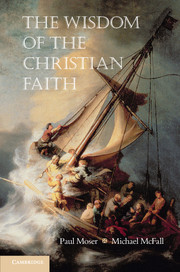Book contents
- Frontmatter
- Contents
- Contributors
- Introduction:Philosophy and Cruciform Wisdom
- Part One Wisdom, Faith, and Reason
- Part Two Wisdom, Love, and Evil
- Part Three Wisdom, Contemplation, and Action
- 9 Meaningful Life
- 10 Beauty and Aesthetics in Theology: The Art and Beauty of Wisdom
- 11 Education for Political Autonomy
- 12 The Wisdom of Hope in a Despairing World
- Index
- References
11 - Education for Political Autonomy
Published online by Cambridge University Press: 05 December 2012
- Frontmatter
- Contents
- Contributors
- Introduction:Philosophy and Cruciform Wisdom
- Part One Wisdom, Faith, and Reason
- Part Two Wisdom, Love, and Evil
- Part Three Wisdom, Contemplation, and Action
- 9 Meaningful Life
- 10 Beauty and Aesthetics in Theology: The Art and Beauty of Wisdom
- 11 Education for Political Autonomy
- 12 The Wisdom of Hope in a Despairing World
- Index
- References
Summary
Political liberals such as Charles Larmore, Martha Nussbaum, and the later John Rawls argue that societies should be well ordered by public conceptions of justice that are specifically political. To say that a view “well orders” a society is to say, among other things, that that view provides the public basis for justifying its fundamental political arrangements. Political conceptions of justice stand in contrast to moral views, which are more comprehensive, such as the perfectionism of Aristotle and Aquinas, the ethical liberalisms of Kant and Mill, and conceptions of justice derived from religious traditions and texts. They are said to promise more appropriate and effective public bases for political justification than comprehensive views do because the foundations on which they are built, the values that they promote, and – important for present purposes – the forms of freedom that they encourage can be endorsed by citizens who hold a wide range of comprehensive views, including religious views. Some skeptics of political liberalism have argued that it cannot fulfill its promise because it requires government – and specifically public education – to promote a kind of freedom that is associated with ethical liberalism, and that is incompatible with certain religious conceptions of freedom. I shall defend political liberalism against this challenge, arguing that it rests on a misunderstanding of political liberalism and of the kind of freedom that an education guided by political liberalism is to promote.
My conclusion will, I hope, go some way toward answering a long-standing question in religious ethics, the question of whether Christians can or should be accepting one of the versions of philosophical liberalism currently on offer. An affirmative answer to this question is important, because those liberalisms defend attractive conceptions of justice that furnish the essentials of just, liberal, and democratic constitutions. A persistent strain in recent Christian ethics is that justice is a “bad idea” for Christians and that Christians are forced to live as “resident aliens” in contemporary liberal democracies like the United States. Showing that political liberalism promotes a conception of freedom that is compatible with the forms of freedom prized by citizens of faith can address one source of Christian alienation.
- Type
- Chapter
- Information
- The Wisdom of the Christian Faith , pp. 218 - 243Publisher: Cambridge University PressPrint publication year: 2012



